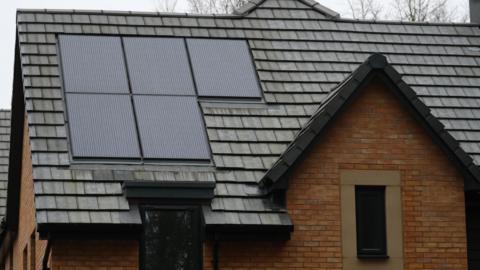Current building regulations do not compel developers to add solar panels to new homes.
The last Conservative government consulted on new regulations including a proposal that new build homes should have rooftop solar panels covering the equivalent of 40% of the building's ground area.
However, they were voted out of power before their proposed changes could be implemented.
The Labour government is now promising to introduce rules which would mandate developers to add solar panels to all new builds.
Asked if the government would stick to the 40% figure proposed by the previous Conservative government, Miliband said the details would be set out in the autumn.
"The problem about the previous system was that it said you would had to have a certain percentage of coverage of solar panels but if you couldn't achieve that percentage you didn't have to do anything at all.
"Under our plans, we are not going to say that. We are going to say even if you can't hit 40% you will still have to have some solar panels, except in rare exceptional cases."
Miliband said the number of homes with solar panels had to be "much, much higher" adding: "It's got to be almost universal."
Asked if he worried developers would pass the cost of adding solar panels on to buyers, Miliband said he didn't think there would be an effect on house prices.
Neil Jefferson, head of the Home Builders Federation, said an estimated two in five new homes had solar panels and that the industry was "getting increasingly used to incorporating solar panels within the building of new homes".
"The government just needs to take care to make sure that it does not prescribe and mandate to much on rooftops."
"If every single home needs to be applied for on an exemption basis that will slow up the delivery of desperately-needed new homes, that administration will be burdensome."
Chris Hewett, from the trade body Solar Energy UK, said local authorities would have to be "vigilant" to ensure developers were meeting their obligations but added that it would be "quite easy to enforce".
He also said he did not expect many homes to be exempt, estimating that 90% of new build homes would have to comply with the new rules.
Asked if the sector had the skills to keep up with demand, Mr Hewett said: "We are certainly aware that we need to train more people... that's something we as an industry are working on."
The announcement comes a week after the government ditched a planning rule in order to make it easier for people to install heat pumps in their homes.
